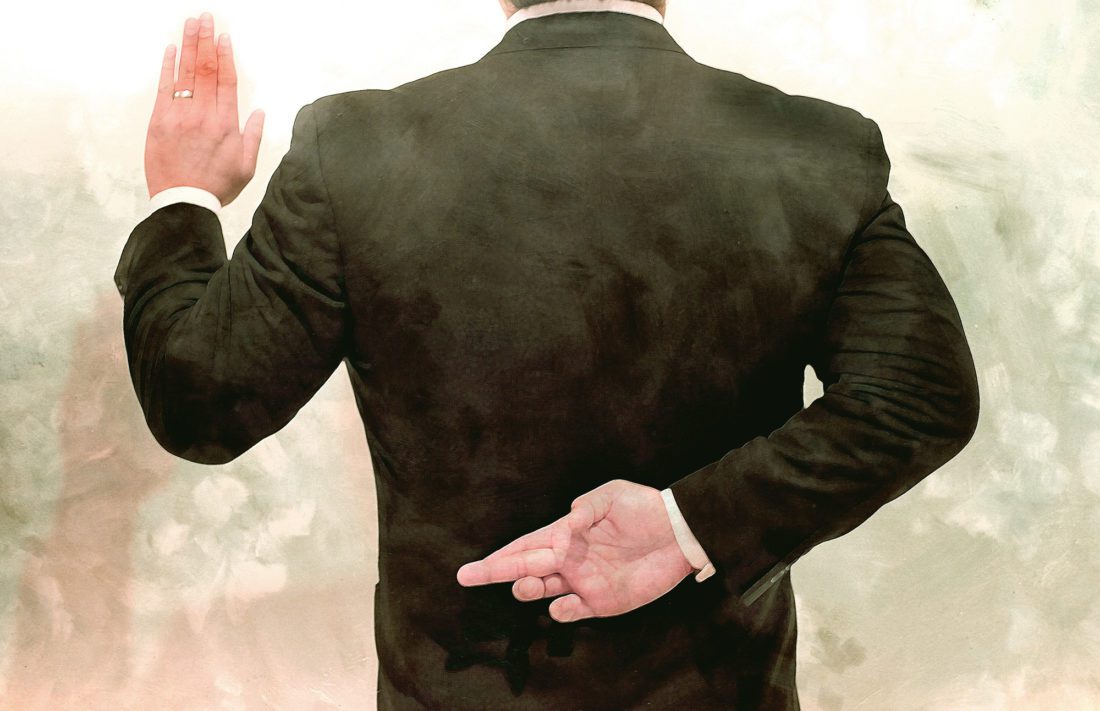New research finds that voters view politicians’ lies about policies as justifiable because they signal partisan loyalty.

Society recognizes that many politicians lie. In five new studies, researchers examined how conservative and liberal Americans responded to politicians’ statements that were called out as false by the media. The studies showed that Republicans and Democrats alike were more likely to rationalize the lies as unintentional or simply label the media reports as “fake news.” But even when they agreed that the politician intentionally told a lie, partisans still saw lies from their own parties’ politicians as relatively more acceptable—particularly when those falsehoods were designed to advance a party’s explicit agenda.
The researchers’ work—which also touches on issues of trustworthiness and morality more generally—has implications for understanding the current hyperpolarized U.S. political climate. The studies, by researchers at Carnegie Mellon University’s Tepper School of Business and the University of California, Berkeley’s Haas School of Business, are forthcoming at the Journal of Personality and Social Psychology.
“Our study suggests that who tells a falsehood, what the falsehood is about, and who is listening all help predict how people explain and evaluate politicians who do not speak the truth,” explains Jeff Galak, Associate Professor of Marketing at the Tepper School, who led the study with Clayton Critcher, Professor of Marketing at Berkeley Haas. “In so doing, the study emphasizes that the moral acceptability of bearing false witness really depends on the extent to which such falsehoods are used in support of or against the explicit aims of one’s political group.”
Flagged falsehoods
In each of the five experiments, participants of varied political orientations learned about a Democratic or Republican politician whose public statements had been found to be untruthful by a fact-checking media source. The researchers called these statements “flagged falsehoods.” The studies examined whether, when, and why people offer partisan evaluations, judging some falsehoods as more acceptable when they came from politicians aligned with their own parties or values.
Galak and Critcher began by identifying two ways partisans arrive at different conclusions about flagged falsehoods. Listeners who share the lying politicians’ political orientation may decide the media report is fake news, or they may rationalize it, telling themselves that the politician did not realize they were lying. Such excuse-making helps them see the original lie as more acceptable. But most centrally, the researchers found that partisan voters continue to disagree about the acceptability of the lies, above and beyond differences in how much they offer up those two excuses.
Personal lies less acceptable
Yet even though Republicans and Democrats generally saw their own party’s lies as more acceptable than those espoused by politicians of the other party, this charitability did not extend to all types of lies. It was strongest for lies about policies, those falsehoods intended to advance a party’s explicit agenda as related to immigration reform, minimum wage laws, or gun control, among other issues. In contrast, opposing partisans more universally condemned personal lies about a politician’s own experience—such as a false claim to have been employed once on minimum wage—or electoral falsehoods that strayed from parties’ explicit goals by aiming to disenfranchise legally eligible voters.
A signal of partisan trustworthiness
Although falsehoods can undermine a politician’s general trustworthiness for members of both parties, the researchers found that policy-focused lies can serve as a signal of partisan trustworthiness, because they lead people to infer that the politician can be trusted by their own side and not by the other. For likeminded partisans, such trustworthiness predicted not only the perceived acceptability of flagged falsehoods, but also perceptions of the politician as a more prototypically moral actor, even outside the political sphere.
These findings begin to paint a more complete picture of why voters can adopt such sharply divergent views of politicians who are called out for making false statements, says Critcher, the Joe Shoong Chair of Business at Berkeley Haas. “When politicians show that they can be trusted by one party more than the other, this is a signal of moral character to fellow in-group members, but also a signal of moral deficiency to the other side. It is thus not simply disinformation, but differential comfort with disinformation, that explains partisan divides in the U.S.”
The research was funded in part by the National Science Foundation.
###
Read the Carnegie Mellon University press release.
Read the full paper:
“Who Sees Which Political Falsehoods as More Acceptable and Why: A New Look at In-Group Loyalty and Trustworthiness”
By Jeff Galak (Carnegie Mellon University) and Clayton R Critcher (University of California, Berkeley)
Journal of Personality and Social Psychology, June 2022
Media contacts:
Caitlin Kizielewicz, Tepper School of Business, 412.554.0074, [email protected]
Laura Counts, Haas School of Business, 510-643-9977, [email protected]